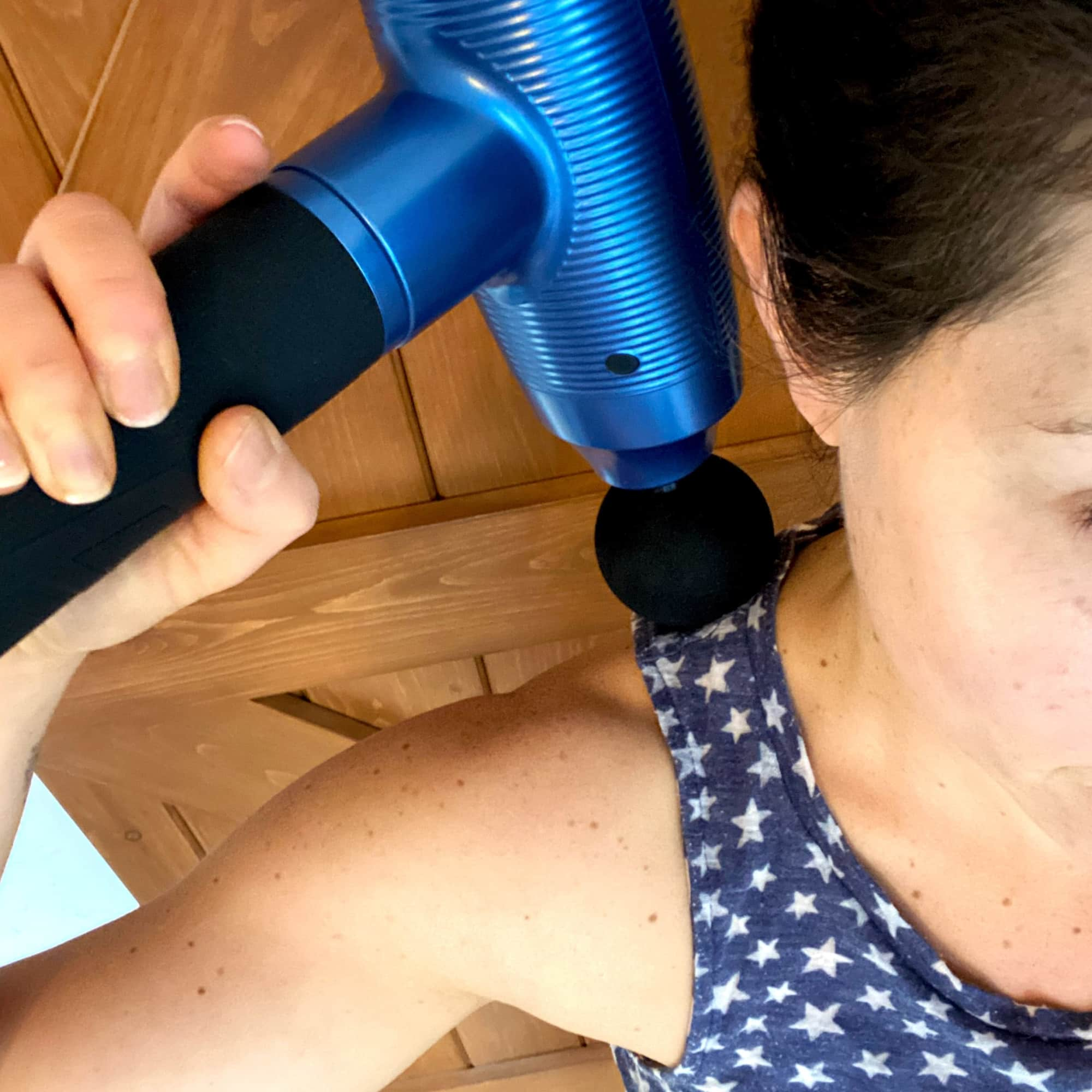
- POPSUGAR Australia
- Fitness
- Why Does My Skin Itch After Using a Vibrating Massage Gun? These Experts Explain
Why Does My Skin Itch After Using a Vibrating Massage Gun? These Experts Explain

After a painful hip and nagging shoulder injury led me to see my physical therapist, I was confused when I experienced an overwhelmingly itchy sensation on my skin while she used a massage gun to loosen my tight muscles. I had to interrupt her to stop and scratch! I discovered that I also felt this itchy sensation when I performed it on myself using the massage gun LifePro sent me, whether I was massaging bare skin or on top of clothes. I was so perplexed by this that I reached out to experts to find out why this was happening.
What Causes Itchy Skin When Using a Vibrating Massage Gun?
- Vibratory urticaria: Board-certified dermatologist Anne Allen, MD, with First Derm, said one cause could be a rare and genetic skin reaction know as vibratory urticaria (vibratory hives). She explained that it’s a red, itchy rash that can occur at the site of any kind of vibration including massage, but could also happen when jogging, riding a lawn mower, mountain biking, or operating power tools. “It occurs due to histamine release from cells and is temporary, but often returns with subsequent vibrations,” she explained.
Often, the reaction that ensues is limited to the areas that are exposed, explained board-certified dermatologist Janiene Luke, MD. But you can have a more robust or generalized reaction where the itchiness and hives spread to other parts of the body.
Dr. Allen reassured that it’s not dangerous in most circumstances and can be prevented with antihistamines as directed by your physician. She also mentioned that it’s possible to experience vibratory urticaria without seeing a rash or hives.
- Pressure urticaria: Under the category of vibratory uticaria is pressure urticaria. It’s when itchy hives are induced after exposure to pressure on the skin from walking, sitting, wearing tight clothes (like a sports bra) or workout gear (like a heart rate monitor), or anything that results in sustained pressure, explained Dr. Luke, including vibrational massage. She added that exercise in general or overheating could also cause a similar reaction.
- Allergic reaction: If the massager is used directly on the skin and not through clothes, Dr. Allen said it’s possible that a component of the massager or something it is cleaned with could be causing an allergic reaction or irritant contact dermatitis. Typically, this would take repeated uses to develop, she said, and is treated with topical steroids.
Another reason for itchy skin could be a reaction to the massage oil or lotion being using on the skin, added physiotherapist and sports massage therapist, Azeezat Adetola Oluwole, PT. She said, “You may be mildly allergic to the massage oil used, and the irritation may cause the skin to itch.”
- Nerves firing: If there is no rash or redness at all, Dr. Allen said another explanation could be that the increase in blood flow causes an increase in the size of the vessels that deliver blood, which could stimulate nerves to fire, resulting in an itchy sensation. Oluwole agreed and added that the vibration could also increase the temperature of the skin and that could also cause itchiness. Amber D. (Hardin) Kivett, CSCS, who has a bachelor’s degree in sports medicine and kinesiology, reminded us that our skin is the greatest sensory organ we have, so it makes sense that some people could have such an intense reaction.
- Nitric oxide in the body: The release of nitric oxide naturally in the body with exercise and mechanical vibration can also cause the effect of itching in some individuals, explained Kivett.
- Spasm: Oftentimes you may develop muscle spasms due to trauma caused from the high levels of vibration, Oluwole explained. These spams may compress and irritate the nerves, causing an itchy-like sensation.
If the itchiness is from one of the last three causes, Kivett said that she sees this in her clients regularly, but by the end of the session, the itchiness goes away. And although the sensation may seem annoying, she said those who experience the itching often feel instant pain relief or reduction, feel lighter or like they’re “floating,” feel less tension, and overall feel a heightened sense of calmness before they leave their appointment.
How Can You Prevent or Treat Itchy Skin When Using a Vibrating Massage Gun?
Don’t self-diagnose, Oluwole said. If you want to use a massage gun, get a physical therapist to provide you with advice on how to use it to be effective at treating your symptoms. She suggested to start off with the lowest vibration setting and slowly increase the frequency over time. This could be enough to avoid a reaction.
If you think the lotion or oil could be the issue, Oluwole said to do a patch test on part of your skin before applying it to your entire body. “You may benefit from getting professional massage lotions that are suitable for dry and sensitive skin, rather than oils,” she added.
If the itchy reaction is bothersome, Dr. Allen said patients should discuss antihistamine use with their primary care physician. Putting a shirt or cloth material in between the massage gun and your skin may also help decrease the reaction.
Ultimately, if the massage is causing skin irritation or the side effects outweigh the benefit or purpose of the vibration therapy, Oluwole said to stop immediately and consult your primary care physician for advice.

